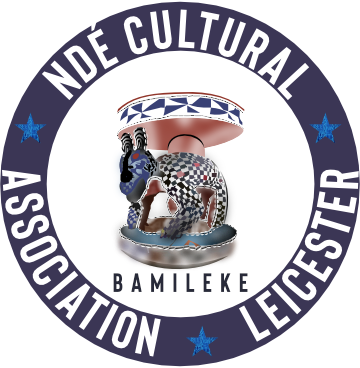About Us
Bamiléké
Ndé Cultural Association Leicester was founded in 2013 to provide general advice and information in the areas of Ndé culture and education to the diverse communities in Leicester and beyond.
The Association promotes awareness of the different cultures in multicultural and diverse Leicester by encouraging communities to come together to share cultural experiences and provide a support network for themselves within the community.
We provide cultural guidance, through arts, poetry, dance, music and sports.
The Bamiléké people are a Central African ethnic group that inhabits the Western High Plateau of Cameroon.
Ndé Division is about 250 Km from Douala the Economic capital, 265 Km from Yaounde the political capital of Cameroon and 50 Km to Bafoussam the regional headquarters.
NDE is the name of the river that separates the two regions of West and Centre. Etymologically, it is highly suspected that the word NDE derives from the standard answer to an ethnic chief/ruler or fon: NÈ! NDE became the name of the whole division on the 3rd of February 1961.
The most common ethnic language in Ndé is called Medúmbà. The Medumba language is mainly monosyllabic.
NDE Particularities
The “Ndab” are genealogical and praise first-names. These are particular names. They may be known before birth. Each girl has two: one from the father and the other from the mother; whereas each boy has only one from the mother. These names go a long way to trace the origin of the bearer and help to address him/ her politely with kindness.
Mission Statement
The Ndé Cultural Association Leicester is dedicated to preserving, celebrating, and promoting the rich diversity of Nde Bamiléké/African cultures, traditions, and heritage. We strive to foster unity, understanding, and pride among African communities and the broader public by creating platforms for education, artistic expression, and cultural exchange. Through our initiatives, we aim to empower individuals, strengthen connections, and inspire future generations to honour and embrace the beauty of Nde Bamiléké/Africa’s cultural legacy In Leicester - UK.Vision
To be the leading hub for celebrating and promoting Nde Bamiléké culture in the UK, fostering a vibrant and inclusive community where the richness of Bamiléké /Africa’s heritage is cherished, shared, and inspires unity and mutual respect. We envision a future where Bamiléké African traditions and contemporary contributions are widely recognised and valued, empowering individuals of African descent and enriching the multicultural fabric of the UK.Aims
- To preserve, celebrate, and promote the diverse cultures, traditions, and heritage of Nde Bamiléké Africa.
- To foster a sense of community, identity, and pride among Nde Bamiléké Africans and people of African descent in the UK.
- To educate and raise awareness about Nde Bamiléké history, arts, and contributions to global culture.
- To promote cultural exchange and mutual understanding between Nde Bamiléké African and other communities in the UK.
Objectives
1. Cultural Events and Celebrations – Organise cultural festivals, workshops, and performances showcasing Nde Bamiléké African music, dance, art, cuisine, and traditions.
2. Educational Programs – Develop programmes and resources to teach African history, languages, and cultural practices in schools and community centres.
3. Community Engagement – Provide platforms for dialogue and collaboration between Nde Bamiléké African communities and other cultural groups in the Leicester.
4. Youth Empowerment – Engage young people through mentorship programmes, leadership training, and creative initiatives to connect them with their African heritage.
5. Networking and Support – Create opportunities for networking, professional development, and business collaboration within the African diaspora.
6. Charity and Outreach – Support African causes locally and globally, including initiatives that address education, healthcare, and poverty alleviation.
7. Partnerships and Collaboration – Build strong partnerships with local authorities, educational institutions, and cultural organisations to enhance visibility and impact.
